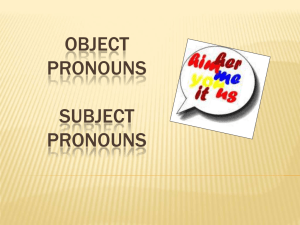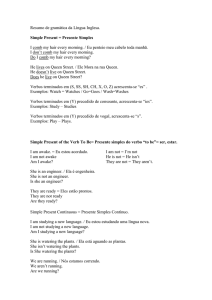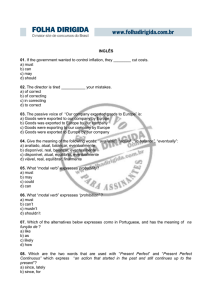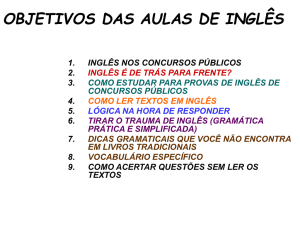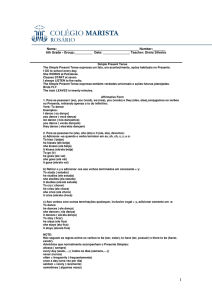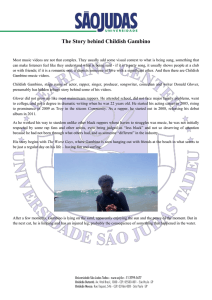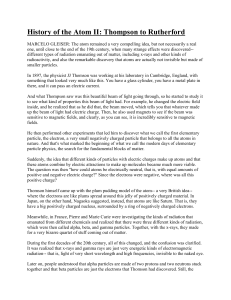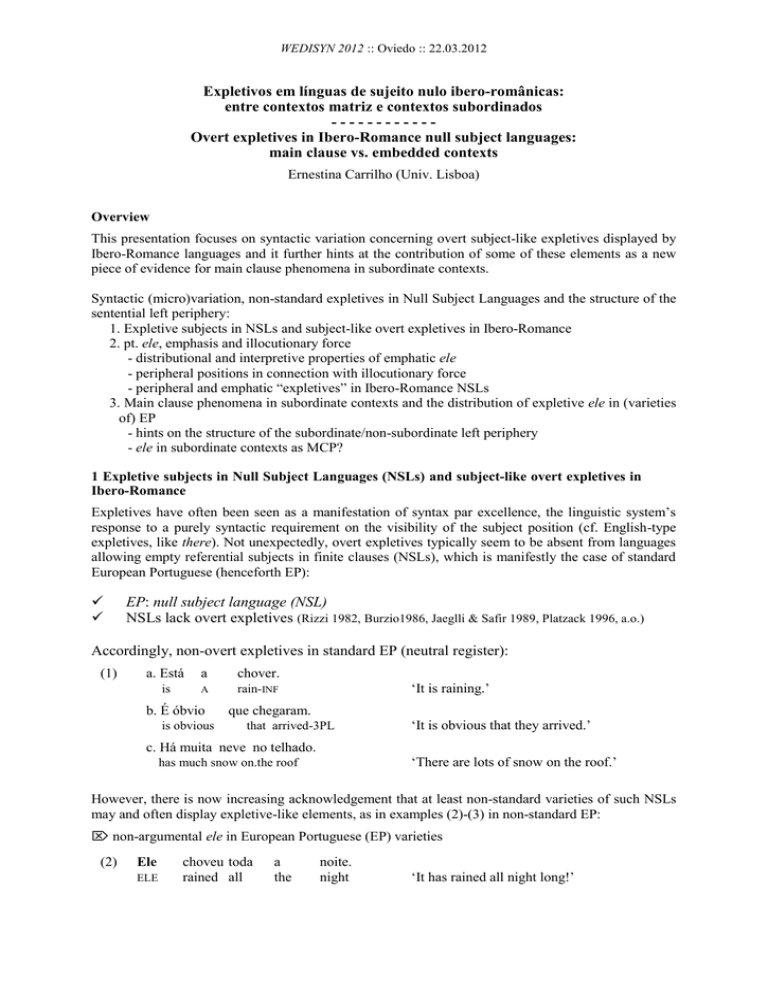
WEDISYN 2012 :: Oviedo :: 22.03.2012
Expletivos em línguas de sujeito nulo ibero-românicas:
entre contextos matriz e contextos subordinados
-----------Overt expletives in Ibero-Romance null subject languages:
main clause vs. embedded contexts
Ernestina Carrilho (Univ. Lisboa)
Overview
This presentation focuses on syntactic variation concerning overt subject-like expletives displayed by
Ibero-Romance languages and it further hints at the contribution of some of these elements as a new
piece of evidence for main clause phenomena in subordinate contexts.
Syntactic (micro)variation, non-standard expletives in Null Subject Languages and the structure of the
sentential left periphery:
1. Expletive subjects in NSLs and subject-like overt expletives in Ibero-Romance
2. pt. ele, emphasis and illocutionary force
- distributional and interpretive properties of emphatic ele
- peripheral positions in connection with illocutionary force
- peripheral and emphatic “expletives” in Ibero-Romance NSLs
3. Main clause phenomena in subordinate contexts and the distribution of expletive ele in (varieties
of) EP
- hints on the structure of the subordinate/non-subordinate left periphery
- ele in subordinate contexts as MCP?
1 Expletive subjects in Null Subject Languages (NSLs) and subject-like overt expletives in
Ibero-Romance
Expletives have often been seen as a manifestation of syntax par excellence, the linguistic system‟s
response to a purely syntactic requirement on the visibility of the subject position (cf. English-type
expletives, like there). Not unexpectedly, overt expletives typically seem to be absent from languages
allowing empty referential subjects in finite clauses (NSLs), which is manifestly the case of standard
European Portuguese (henceforth EP):
EP: null subject language (NSL)
NSLs lack overt expletives (Rizzi 1982, Burzio1986, Jaeglli & Safir 1989, Platzack 1996, a.o.)
Accordingly, non-overt expletives in standard EP (neutral register):
(1)
a. Está
a
chover.
is
A
rain-INF
b. É óbvio
is obvious
„It is raining.‟
que chegaram.
that arrived-3PL
„It is obvious that they arrived.‟
c. Há muita neve no telhado.
„There are lots of snow on the roof.‟
has much snow on.the roof
However, there is now increasing acknowledgement that at least non-standard varieties of such NSLs
may and often display expletive-like elements, as in examples (2)-(3) in non-standard EP:
non-argumental ele in European Portuguese (EP) varieties
(2)
Ele
ELE
choveu toda
rained all
a
the
noite.
night
„It has rained all night long!‟
E. Carrilho
(3)
Ele
ELE
há
has
cada
such
uma!
one
„There are such things!‟
In these contexts (impersonal constructions), ele as an element that is:
> devoid of argumental / referential content
> homophonous to pronoun [3 SG, MASC, NOMINATIVE]
often analysed as an expletive subject
(Cunha & Cintra 1984, Raposo 1992, Mateus et al. 2003, a.o.)
non-argumental ele expletive subject
- non-obligatory, allows variation:
“familiar style” (Said Ali 1927), “informal speech” (Epifânio Dias 1927), “popular or popular-like
varieties” (Leite de Vasconcelos 1901, Cunha & Cintra 1984, Vilela 1995), “archaic dialects” (Mateus e tal.
2003)
- near-standard expressive use (spoken and written) in restricted impersonal constructions (haver, ser)
(4)
Ele
ELE
há marotos muito grandes na tropa!
„There are such rascals in the troops!‟
has rascals very great in.the troops
(Camilo Castelo Branco, Corja, 24, apud Epifânio Dias 1918, 1933: 21)
(5) Ele há dias assim.
ELE
(6)
(weekly newspaper Expresso, 25.10.2003)
„There are such days.‟
has days like.that
As imagens das operações militares […] invadiram as casas dos confundidos habitantes
the images
da
of.the operations military
capital. Ele eram os oficiais a dar
invaded
the houses of.the confused
inhabitants
ordens, ele eram os sargentos a berrar para
of.the capital ELE were the officers A give-INF orders ELE were the sergeants
A
shout
to
as fazer
cumprir, e eram os sapadores a instalar barreiras […].
them make-INF follow-INF and were the soldiers
A install-INF barriers
(José Saramago 2004: 69)
„The images of the military operations […] invaded the capital‟s confused inhabitants‟
homes. The officers were giving orders, the sergeants were shouting to make people follow
them, and the soldiers were installing barriers […].‟
beyond expletive subjects:
Aparece, às vezes, como sujeito frásico de verbos impessoais ou unipessoais, ao jeito
do francês, do inglês e do alemão, uso ainda observável, sobretudo na linguagem do
povo, em Portugal […]. Tem, às vezes, caráter expletivo, servindo para realçar o
sujeito dantes expresso […]. Outras vezes, sem perder esse caráter, apresenta-se (no
falar lusitano) contaminado de afetividade mais ou menos intensa e despido de
qualquer conteúdo lógico.
(AURÉLIO 1986: 623, s.v. ele)
[Sometimes, it [ele] appears as the subject of impersonal verbs, like in French, English
and German, an usage which may be observed still today in popular language in
Portugal […]. Sometimes, it has an expletive character, and it is used to reinforce a
formerly expressed subject […]. In other cases, also as an expletive, (in the European
usage) it appears connected to some intense emotional involvement, and deprived of
any logic content. – my translation]
[...] I am not convinced that the expletive one gets in French is of the same sort as the
expletive in archaic dialects [Portuguese, Galician and Asturian, EC], the French one
being a consequence of the impossibility of pro-drop.
Uriagereka 1992, 1995: 168
2
E. Carrilho
Pt. ele appears to parallel, to different extents, other seeming overt expletives in (varieties of) related
null subject languages, such as Galician el, Asturian el, Catalan (from Baleares) ell and ello in some
American or diachronic varieties of Spanish.
Independent works on each of these expletives have pointed, at different times, and under different
formats, to the discursively multifaceted nature of these elements:
American Spanish varieties (Henriquez Ureña 1939, Uriagereka 1995, Fernández Soriano 1999, a.o.)
(7)
Ello hay dulce de ajonjolí?
(8)
Ello llegan guagas hasta acá.
(9)
Ello es fácil llegar.
(10) Ello veremos.
(11) Ello, quizás no viene.
(12) ello sí
En el siglo XVIII se ha consolidado este valor de mero elemento de énfasis: es común
en Moratín. Persiste en el siglo XIX, en escritores del período romantico como
Martínez de la Rosa, Larra e Hartzenbusch. Como en el siglo XVII, se presenta con o
sin indicación de pausa. Así persiste en el habla de Santander y en la de Santo
Domingo, donde al fin se desvía del carácter enfático hacia el concesivo. […]
Todos estes usos desaparecen, al fin, de la lengua culta, y el pronombre mismo
ha perdido vitalidad en el habla, aunque la literature lo mantiene. Sólo en el habla de
España y de las Antillas subsiste, con buena parte de sus antiguas funciones múltiples.
En la Argentina lo conserva la lengua escrita, y hasta lo prodiga, en documentos
oficiales y judiciales, en libros y periódicos; pero el habla lo ha abandonado, y ya era
muy raro en la poesía gauchesa del siglo XX.
Henríquez Ureña 1939: 229
Catalan from Baleares (Spitzer 1945, Alcover and Moll 1951, Veny 1999, Solà et al. 2002, i.a.)
(13) Ell ha de ploure un dia o altre!
will rain a day or other
„It will rain one of these days!‟
EXPL
(14) Ell aixó no acaba mai!
EXPL this NEG ends up never
„This does not end up!‟
Galician (Álvarez Blanco 1981, 2001, 2002, Álvarez et al. 1986, Uriagereka 1995, Uriagereka 2004, Kaiser
2006, i.a.)
(15) El chovía miudiño.
(16) El hai máis ca antes.
(17) El é certo que iso acontecéu.
(18) ¿ El tendes por aí un martelo que me poidades emprestar?
(19) ¿ El hai leite?
(20) ¿Xa
te mollaches, el si?
(21) No fixeches caso, ¿el non?
3
E. Carrilho
(22) ¿ El que che passou?
(23) El tamém son ben caras! [as sardiñas]
Asturian (Fernández 1960: 63; Silva-Villar 1998)
(24) El cúmu te chamas?
2 Pt. ele, emphasis and illocutionary force
Ele as an emphatic word
-
non-argumental ele in EP popular varieties also in an extremely wide spectrum of contexts that
go far beyond the quasi-standard use in impersonal constructions
this element is tied to positions in the left periphery of the sentence which are active for emphasis
on the illocutionary force
emphatic ele in particular positions within the left periphery of the sentence
> distributional properties
> emphatic effects
EP data as worked in Carrilho 20051
2.1 The distribution of emphatic ele in EP varieties
- sporadic: 298 instances / corpus 200.000 w
- “optional”
(25) É a estrela-da-manhã (…) e há a estrela… Bom, ele há várias estrelas, não é?
is the morning star
and has the star
(AAL92)
good ELE has several stars NEG is
„That‟s the morning star (…) and there is the star… Well, there are several stars, aren‟t
there?‟
E.g.: AAL - incidence of ele in existential haver constructions: 6%
2.1.1 Ele in the immediately preverbal position
- impersonal constructions
(i) before semantically impersonal predicates:
(26) Ah,
INTJ
se chover
era melhor, mas ele não chove
if rain-FUT.SUBJ was better
amanhã.
(MST11)
but ELE NEG rain-PRES3SG tomorrow
„Oh, it would be better if it rains, but it won‟t rain tomorrow.‟
(27) Ele podia ser aí (…) uns trezentos metros da minha.
ELE could
be there
some 300
(COV23)
meters from mine
„It could be some 300 meters far from mine [=my house].‟
1
For the most part of them, corpus data from CORDIAL-SIN (Syntax-Oriented Corpus of Portuguese dialects,
http://www.clul.ul.pt/en/resources/411-cordial-corpus). This corpus compiles selected excerpts of spontaneous or
semi-directed speech produced by non-instructed, old and rural speakers during dialectal interviews for
traditional linguistic atlases.
The data inspected by Carrilho (2005) correspond to a subcorpus of CORDIAL-SIN amounting to circa 200.000
words, from 17 locations geographically spread over the Portuguese territory (continental and insular). Besides
corpus data, examples also include occasional spontaneous data (for which some sociolinguistic source
identification is usually added) and intuitive data whenever possible (examples for which no source is indicated).
CORDIAL-SIN examples are here systematically followed by codes identifying the source location for the
example within the corpus.
4
E. Carrilho
(28) A gente cá, eles empregam cá outro nome disto. […] Ele não é carochas. (ALC42)
the people here they use
here other name of.this
ELE NEG is
carochas
„People here use a different name for this. It‟s not carochas‟.
(29) […] ele
falta-me
aqui umas peças do tear, quero saber onde elas estão.
miss-3SG-to.me here some pieces of.the loom want-1SG to.know where they are
ELE
„[…] some pieces of the loom are missing, I want to know where they are.‟ (MST16)
(ii) in presentative constructions:
(30) Ele lá vinham
ELE LÁ
os rapazes e as raparigas (OUT14)
„There came the boys and the girls‟
came-3PL the boys and the girls
(31) ele estava (…) o cortiço cheio de abelhas (COV37)
ELE was
the beehive full of bees
„the beehive is full of bees‟
(iii) in clausal subject extraposition:
(32) Mas não quer dizer que não haja,
but NEG
means
mas (ele) é raro quando se vê. (ALV23)
that NEG have-PRES.SUBJ.3SG but ELE is rare when SE sees
„But it doesn‟t mean that there isn‟t [Null Object: that fish], but it is rare to see one of them.‟
- subject relative clauses:
(33) É aquelas correias grandes que ele nasce
is
nas pedras.
(ALV46)
that ELE grows in.the stones
“straps” big
those
„That‟s those big “straps” that grow from the stones.‟
- argumental null subject sentences:
(34) Ele boto-lhe assim a água ao meu. (MST35)
ELE
put-1SG-to.it thus the water to.the mine
„I put water in mine like this.‟
(35) Ele
ELE
voltámos
lá todos a ver […] (COV32)
went.back-1PL there all A see-INF
„We all went back there to see…‟
(36) (…) esses não morreram. Ele escaparam. (COV32)
those NEG died-3PL
ELE
escaped-3PL
„Those didn‟t die. In fact, they escaped.‟
2.1.2 Ele in a peripheral position
(37) Ele (a) folha do pinheiro é em bico. (ALC19)
ELE
the leaf of.the pine-tree is in point
„Pine tree leaves are pointed.‟
(38) Que ele eu gosto de socorrer (…) as pessoas, homem! (COV23)
QUE ELE I
like of help-INF
the people
man
„I like to help people, man!‟
(39) Mas ele o nosso governo não protege nada a agricultura. (COV14)
but ELE the our government NEG protects nothing the agriculture
„But our government doesn‟t really protect agriculture.‟
(40) Que ele, ainda hoje, há essa tradição, cá.
QUE ELE
(AAL20)
even today has that tradition here
„In fact, even today, there is that tradition here.‟
(41) Haver… Ele a fome
não havia! (VPA06)
have-INF ELE the hunger NEG had
„As for existing, the hunger didn‟t exist!‟
5
E. Carrilho
(42) INQ2 Então e antigamente o que é que se fazia em vez destes, destes?…
„Interviewer2: So in the past what did people make instead of these, of these?…‟
INF Ele antigamente, (…) estes coisos aqui, (…) estes coisos que eles
ELE
in the past
these things here
these things that they
fazem aqui, esta 'chupa', era de fazer o covato mais pequenino. (ALC03)
make here
this chupa
was of making the hole smaller
„In the past, these things here, these things that they make here, this chupa, this was for
making smaller holes.‟
(43) Tu sabes bem que ele em Paçô eles viram para aquele lado […] (COV28)
you know well that ELE in
Paçô they turn
to
that
side
„You know well that at Paçô they turn to that side…‟
sorte e tal! Agora tu, ele qualquer dia o lobo vem e"… (CTL13)
(44) "Ah, que tanta
how.much luck and so now you ELE one day
INTJ
the wolf comes and
„Oh, so much luck, and so and so! Now you, one of these days the wolf comes and…‟
Non-argumental ele is found in a position peripheral to different kinds of elements which are
themselves left-peripheral in the sentential structure:
– adverbial phrases, as in (40) and (42) above, other phrases with locative or temporal import, such
as in examples (43) and (44), and also different types of adverbial clauses:
(45) Ah, isso é o trigo, que ele quando se quer tirar a sêmea, que se quer o trigo
INTJ that
is the wheat
QUE ELE
when SE wants take.out the bran QUE SE wants the wheat
melhor, peneira-se duas vezes […] (OUT25)
better
sifts-SE
twice
„Oh that is wheat – actually when you want to take out the bran, if you want better wheat, you
sift twice.‟
(46) A gente
pegou, dá-lhe até uma molhadela para que fique
the people took gives-to.it even a
wetting
to
molinho, mas ele,
that become-PRES.SUBJ soft
but
ELE
estando eles bons, não precisam. (OUT55)
be-GER they good NEG need
[speaking of grafting] „We took/joined [that], we even wet it so that it becomes soft, but
when they are good, they don‟t need it.‟
– different kinds of marked topics, such as topicalized phrases, as in (47), just like in (41) above, or
some types of hanging topics:
(47) Ele isso aqui a gente chamava um… […] Parece que era o pernil que a gente chamava a isto.
ELE
that here the people called
a
seems that was the pernil that the people called to this
„That, we called a … It was not hook, it was… It seems that it was the pernil what we called
this.‟ (ALC30)
(48) Olhe que aquilo no livro! E ele eu, o homem leu aquilo diante de mim! (COV18)
look that that
in.the book and ELE I the man
read that
before
me
„Look, that was in the book! And me, the man read that before me!‟
– fronted wh-phrases:
(49) Não sendo no
NEG
Natal, ele quem é que os come?! Ninguém. (OUT50)
be-GER in.the Christmas ELE who is that them eat
nobody
„If it is not by Christmas, who will eat them?! Nobody.‟
– other fronted constituents, namely the kind of affective phrases (Raposo 1995, after Klima 1964) that
appear in a left peripheral position in evaluative sentences:
(50) Que ele até com um pau se malha. (MST37)
QUE ELE
even with a stick SE threshs
„Actually we thresh even with a stick.‟
6
E. Carrilho
– the initial phrase in cleft constructions:
(51) Ele depois de vir
do
lago é que se amaçava. (FLF17)
after of come-INF from.the lake is that SE struck-3SG
ELE
„It was after it comes from the lake that we struck the flax.‟
(52) Ele quem se casa são eles! (COV13)
ELE
who SE marries are they
„They are who will marry!‟
Other contexts for peripheral ele:
- imperative sentences:
(53) INF2 Quer passar por lá (para ver)?
„Informant2: Do you want to go there (to see it)?‟
INF1 Ele vamos embora! (FIG27)
ELE go-PRES.SUBJ-1PL away
„Informant1: Let‟s go!‟
–
answers to yes-no questions:
(54) INQ2 Mas lá para cima para onde? Para Montes de Alvor?
„Interviewer2: Where up there? To Montes de Alvor?‟
INF Ele não. Da parte (…) da praça que chamam a praça de Alvor […] (ALV01)
ELE NEG
from the side of_the place that call-3PL the place of Alvor
„Informant: NO! From the side of the place that is called the place of Alvor…‟
–
question-tags:
(55) Mas esse já conhecem, ele já? (OUT40)
but that already know-3PL ELE already
„But you already know that one, don‟t you?‟
–
independent phrases, such as parentheticals:
(56) E depois (…) começou como ontem a nevar e a saraivar e a chover, e a mulherzinha, coitada,
and then
began-3SG like yesterday A snow-INF and A hail-INF and A rain-INF and the woman poor
(…) – ele roupinhas fracas! – veio por aí fora, chegou aqui acima arreganhou. (COV22)
ELE
clothes
thin
came from there
arrived here up
chilled
„And then, it began to snow, to hail and to rain like yesterday, and the poor woman – her
clothes were thin! – came from there, when she arrived up here, she chilled.‟
–
in isolation:
(57) Isto aqui é uma… Ai, ele! Eu 'desqueceu-me' o nome disso. (ALC03)
this here is a
INTJ ELE
I
forgot
the name of.that
„This is a… Oh! There now! I forgot its name.‟
2.1.3 Ele in postverbal position
(58) Seja
ele trigo ou cevada ou aveia. (PAL22)
be-PRES.SUBJ-3SG ELE wheat or barley or oats
„Be it wheat or barley or oats.‟
(59) Eu tinha ele um irmão, que trabalha de carpinteiro também. (PFT17)
I
had
ELE
a brother that works as carpenter
also
„Even me – I had a brother, who works as a carpenter...‟
7
E. Carrilho
(60) INQ1 Diz que faz bem aos olhos.
„Interviewer1: They say that it is good for the eyes.‟
[…]
INF2 Ah, bem aos olhos faz ele tudo, (…) quando não haver pouca sorte. (PAL28)
INTJ
good to.the eyes makes ELE everything
when
NEG
have-INF bad luck
„Informant2: Oh, everything is good for the eyes, when you do not have bad luck.‟
2.2 Pragmatic effects of non-argumental ele
> devoid of argumental import
> expressive effect
Exclamatives: emphasis on expressive value
(61) Ele ele disse que era (…) de São João da Madeira, homem! (COV21)
ELE
he said that was
from São João da Madeira man
„(It is true that) he said that he was from São João da Madeira, man!‟
(62) Ele nunca me olhava
ELE
a nada,
nunca tinha medo nenhum! (ALV25)
never me was.frightened-1SG to nothing never had-1SG fear none
„I was never frightened by anything, I was never afraid of anything!‟
(63) INQ1 Vão no mesmo baile aqui?
Interviewer: Do you go to the same ball?
INF1 E foi ruim a noite! Ele era velhas e tudo! (OUT43)
Informant1: and was bad the night ELE was old women and everything!
„The night was bad [ironic]! Even old women danced!‟
Declaratives: emphasis on assertive value (strong evidentiality marker)
the interpretive result brought by ele is close to that conveyed by expressions such as é verdade que „it is true
that‟, de facto „in fact‟, realmente „actually‟:
(64) É a estrela-da-manhã (…) e há a estrela… Bom, ele há várias estrelas, não é? (AAL92)
is the morning star
and has the star…
good, ELE has
several stars, not is
„That‟s the morning star (…) and there is the star… Well, there are several stars, aren‟t
there?‟
(65) Porque isto (…) é assim; esta questão (…) de chá, de doenças, disto e daquilo,
because this
is like.this this issue
on tea
on illness on this and on that
de muita coisa – ele (…) há cura para tudo. (PAL08)
on many thing
ELE
has cure for everything
„Because it is like this; this issue (…) on tea, on illness, on many different things: there is a
cure for everything.‟
(66) Mas, ele havia muita fome, naquele tempo. (VPA06)
but
ELE had
much hunger
in.that
time
„But there was a lot of hunger in those times.‟
Imperatives: emphasis on directive value
ele may combine with other elements that strengthen the directive force of the imperative, like já, lá or
mesmo, but, on the contrary, it may not combine with elements that mitigate the directive force
(67) Ele vamos {já, lá, mesmo} embora!
ELE go-PRES.SUBJ-1PL away
„Let‟s go right now!‟
(68)
#
Ele vamos embora {se não se importam, por favor}!
if you don‟t mind
please
8
E. Carrilho
Questions: expressive value
(69) Não sendo no
Natal, ele quem é que os come?! Ninguém. (OUT50)
be-GER in.the Christmas ELE who is that them eat
NEG
nobody
„If it is not by Christmas, who will eat them?! Nobody.‟
ele appears only in special questions (Obenauer 2004, 2006)
(70)
#
Ele qual é a sua data de nascimento?
ELE
what is the your date of birth
„What is your date of birth?‟
(71) - Posso entrar? [familiar client at the entrance of a bar]
„May I come in?‟
- Então ele não está a porta aberta? [barman, middle-aged, Redondo -2008]
so
ELE NEG is
the door open
„Isn‟t the door open?!‟
(72) – Quem é que come estes bolos?
who
is that eats
these cakes
„Who eats these cakes?‟
- As crianças. / - Ninguém.
the children
nobody
„Children do.‟ / „Nobody.‟
(73) – Ele quem é que come estes bolos?
ELE
who
is that eats
these cakes
„Who eats these cakes?‟
- #As crianças. / - Ninguém.
the children
nobody
„Children do.‟ / „Nobody.‟
Postverbal “ele”: expressive value
(74) INQ1 Diz que faz bem aos olhos.
„Interviewer1: They say that it is good for the eyes.‟
[…]
INF2 Ah, bem aos olhos faz ele tudo, (…) quando não haver pouca sorte. (PAL28)
INTJ
good to.the eyes makes ELE everything
when
NEG
have-INF bad luck
„Informant2: Oh, everything is good for the eyes, when you do not have bad luck.‟
(75) Muitas noites passaram ele os pastores na serra!
many nights
passed
ELE
the shepherds in.the mountain
± „The shepherds passed many nights at the mountain!‟
(76) Isso sabia ele a Maria.
that knew ELE the Mary
± „That was what Mary knew.‟
(77) Eu tinha ele um irmão, que trabalha de carpinteiro também. (PFT17)
I
had
ELE
a brother that works as carpenter
also
„Even me – I had a brother, who works as a carpenter...‟
Emphatic ele adds, in this case, expressive value to a otherwise non-expressive sentence:
(78) Aqui debaixo tínhamos uma pia.
here under[this] have-1PL a sink
„Here, under this, we had a sink/there was a sink.‟
9
E. Carrilho
(79) Aqui debaixo tínhamos ele uma pia.
here under[this] have-1PL ELE a sink
„It was even the case that we had a sink here!‟
(80) Aqui debaixo tínhamos
uma pia, {não era, não tínhamos}?
here under[this] have-Imperf.1PL a
(81)
#
Aqui debaixo tínhamos
sink
NEG
was NEG have-Imperf.1PL
ele uma pia, {não era, não tínhamos}?
here under[this] have-Imperf.1PL ELE a
sink
NEG
was NEG have-Imperf.1PL
- Discourse effects: the expletive does not affect the distribution of information in the sentence
(82)
INQ Mas o tear era igual ou era mais largo?
„Interviewer: But the loom had the same width or was it wider?‟
INF (Não. Ele era lá agora!) Ele o tear do pardo era muito largo.
no EXPL was LÁ now EXPL the loom of.the dun [cloth] was very wide
„(No. Sure it wasn‟t!) The loom for dun cloth was indeed very wide.‟
(OUT21)
- Syntactic distribution: above other projections within the left periphery
- Possible connection with the behavior of other Ibero-Romance expletives?
Galician – emphasis on expressive and assertive force
Catalan – emphasis on expressive force
American Spanish – emphasis – expressive/assertive force ? +?
Cf. also similar effect in varieties of other Romance languages (Ledgeway 2009)
2.3 Peripheral positions for ele
ForceP or EvalP and the overt expletive
(83) As pias há-as quadradas (e) há outras redondas, não é? […] Eu tenho-as aí…
„As for sinks, there are some of them square and some rond, isn‟t it? I have some there…‟
[…] Ele aqui debaixo tenho ele assim umas pias para os pequeninos, para lá comerem,
EXPL here
INF-3PL
under[this] have-1SG EXPL thus some sinks to
the small.ones to there eat-
„Here, under this, I have some sinks for the small ones, for them to eat there.‟ (OUT33)
10
E. Carrilho
A.
ForceP
ru
Force‟
Ele
ru
Force
...
4
aqui debaixo tenho ele assim umas pias para os pequeninos ...
B.
ForceP
ru
Force‟
Ele
ru
Force
EvalP
ru
Eval‟
4
aqui debaixo
ru
Eval
ty
tenho
ele
IP
5
assim umas pias...
3. Main clause phenomena in subordinate contexts and the distribution of expletive ele in
(varieties of) EP
- relating to the structure of the subordinate/non-subordinate left periphery
- peripheral ele in subordinate contexts as MCP?
- Ele in embedded contexts
(84)
Mas olhe que eu, eu tenho a impressão (…) que ele que havia ainda lá disso.
but
look that I
I have the impression
that EXPL that had still there of.that
But look, I have the impression that there was some of that there
(85)
(AAL21)
Tu sabes bem que ele em Paçô eles viram para aquele lado e a gente encaminhava
you know well that EXPL in Paçô they turn to that side and the people turned
logo
para este lado. (COV28)
immediately to
this side
You know well that at Paçô they turn to that side and we immediately turn to this side.
C.
… [FORCEP [ele ] [ que [ … ] ] ]
D.
… [SUBP que [FORCEP [ele ] [ FORCE0 [ … ] ] ].
(cf Bhatt and Yoon 1992, Alexiadou 1997, Roussou 2000 and Haegeman 2002)
- Asymmetry: Peripheral “Postverbal” ele restricted to main clause contexts
(1)
[Muitas azeitonas] comeram ele os pastores!
many olives
ate
ELE
the shepherds
±„The shepherds ate many olives!‟
11
E. Carrilho
References:
Álvarez, Rosario. 2001. El Vai Ben Así: Pervivencia e Construccións de el Invariable. Cadernos de Lingua. 23. 5-33.
Álvarez, Rosario. 2002. El Foy a Primeira Vez: Testemuños Antigos de el Invariable. In Ramón Lorenzo (coord.) Homenaxe
a Fernando R. Tato Plaza. Santiago de Compostela: Universidade de Santiago de Compostela. 23-36.
AURÉLIO Ferreira, Aurélio Buarque de Holanda. 1986. Novo Dicionário Aurélio. Rio de Janeiro: Nova Fronteira. 2nd rev.
edition.
Bennis, Hans. 2001. Featuring the Subject in Dutch Imperatives. In W. van der Wurff (ed.) Imperative Clauses in Generative
Grammar. Leiden. 19-37.
Burzio, Luigi. 1986. Italian Syntax. A Government-Binding Approach. Dordrecht: Kluwer.
Carrilho, Ernestina. 2005. Expletive ele in European Portuguese Dialects. Ph. D. dissertation. Universidade de Lisboa.
Carrilho, Ernestina. 2009. Sobre o expletivo ele em português europeu. Estudos de Lingüística Galega. 1. 7-26.
(http://ilg.usc.es/elg/volume/1/pescuda/Pescuda_Carrilho_ELG01_2009.pdf)
Cunha, Celso and L. F. Lindley Cintra. 1984. Nova Gramática do Português Contemporâneo. Lisboa: João Sá da Costa.
DCVB Alcover, Antoni Maria and Francesc de Borja Moll. 1926-1963. Diccionari Català-Valencià-Balear. Barcelona:
Editorial Moll. (Also: http://dcvb.iecat.net)
Dias, A. Epifânio da Silva. 1918. Syntaxe Histórica Portuguesa. Lisboa: Livraria Clássica Editora. 2nd edition, 1933.
Duarte, Inês. 1987. A Construção de Topicalização na Gramática do Português: Regência, Ligação e Condições sobre
Movimento. Doctoral dissertation. Faculdade de Letras da Universidade de Lisboa.
Fernández, Joseph A. 1960. El habla de Sisterna. Revista de Filología Española. Anejo LXXIV. Madrid: Consejo Superior
de Investigaciones Científicas.
Fernández Soriano, Olga. 1999. El Pronombre Personal. Formas y Distribuciones. Pronombres Átonos y Tónicos. In Ignacio
Bosque and Violeta Demonte (coord.) Gramática Descriptiva de la Lengua Española. Madrid: Espasa. 1209-1273.
Henríquez Ureña, Pedro. 1939. Ello. Revista de Filología Hispánica 1: 3. 209-229.
Hinzelin, Marc-Olivier and Georg A. Kaiser. 2007. El pronombre «ello» en el léxico del español dominicano. In Wiltrud
Mihatsch and Monica Sokol (eds.), Language contact and language change in the Caribbean and beyond / Lenguas en
contacto y cambio lingüístico en el Caribe y más allá. Frankfurt: Petr Lang. 171-188.
Jaeggli, Osvaldo and Kenneth Safir (eds.) 1989. The Null Subject Parameter. Dordrecht: Kluwer Academic Publishers.
Kaiser, Georg A. 2006. Pronombres sujeto en construcciones impersonales de lenguas iberorrománicas, in Beatriz Fernández
e Itziar Laka (eds.), Andolin gogoan. Essays in Honour of Professor Eguzkitza. Vitoria-Gasteiz: Universidad del País
Vasco / Euskal Herriko Unibertsitatea. 513-530.
Klima, E. 1964 Negation in English. In J. Fodor and J. Katz (eds.) The Structure of Language: Readings in the Philosophy of
Language. New Jersey: Prentice-Hall, Englewood Cliffs. 246-323.
Mateus, Maria Helena Mira, Ana Maria Brito, Inês Duarte, Isabel Hub Faria and Sónia Frota, Gabriela Matos, Fátima
Oliveira, Marina Vigário and Alina Villalva. 2003. Gramática da Língua Portuguesa. Lisboa: Caminho.
Obenauer, Hans-Georg. 2004. Nonstandard Interrogatives: Sentences Types, the Left Periphery, Wh-Doubling, and
(Apparently) Optional Elements. Hand-out of talk presented at Going Romance. Leiden, December 2004.
Obenauer, Hans-Georg. 2006. Special Interrogatives – Left Periphery, Wh-Doubling, and (Apparently) Optional Elements. In
Jenny Doetjes and Paz González (eds.) Romance Languages and Linguistic Theory 2004. Selected papers from „Going
Romance‟, Leiden, 9-11 December 2004. Amsterdão: John Benjamins. 247-273.
Raposo, Eduardo Paiva. 1995. Próclise, Ênclise e a Posição do Verbo em Português Europeu. In João Camilo dos Santos and
Frederick G. Williams (eds.) O Amor das Letras e das Gentes. In Honor of Maria de Lourdes Belchior Pontes. Santa
Barbara: Center for Portuguese Studies. University of California at Santa Barbara.
Raposo, Eduardo Paiva. 1992. Teoria da Gramática. A Faculdade da Linguagem. Lisboa: Caminho.
Rizzi, Luigi. 1982. Issues in Italian Syntax. Dordrecht: Foris.
Saramago, José. 2004. Ensaio sobre a Lucidez. Lisboa: Caminho.
Solà, Jan, Maria-Rosa Lloret, Joan Mascarò and Manuel Pérez Saldanya (dir.) 2002. Gramática del Català Contemporani.
Barcelona: Empúries.
Spitzer, Leo. 1941. Paralelos Catalanes y Portugueses de ello. Revista de Filología Hispánica. 3. 272.
Silva-Villar, Luis. 1998. Subject Positions and the Roles of CP. In A. Schwegler, B.Tranel and M. Uribe-Etxebarria (eds)
Romance Linguistics. Theoretical Perspectives. Amsterdam/Philadelphia: John Benjamins. 247-270.
Uriagereka, Juan. 1992. A Focus Position in Western Romance. Talk presented at GLOW 15. Lisbon, 1992.
Uriagereka, Juan. 1995. An F Position in Western Romance. In K. É. Kiss (ed.) Discourse Configurational Languages.
Oxford: Oxford University Press. 153-175.
Uriagereka, Juan. 2004. A Peripheral Pleonastic in Western Iberian. Hand-out of talk presented at Expletive Subjects in
Romance and Germanic Languages. Konstanz, Germany, November 2004.
Veny, Joan. 1999. Aproximació al dialecte eivissenc. Palma de Maiorca: Moll.
Vilela, Mário. 1995. Gramática da Língua Portuguesa: Gramática da Palavra, Gramática da Frase, Gramática de Texto.
Coimbra: Almedina.
12


